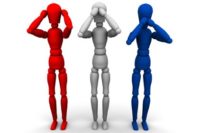Please, don’t hunt me down
It’s getting so someone knows your every move

Then an army of Obama volunteers hit the ground and began knocking on the doors of these targets. The article I read said the volunteers could strike up friendly conversations at the start with these folks because they knew things like the person’s favorite movie.
This scares me. How do “they,” whoever “they” may be, know what my favorite movie is? Is it my purchasing history with the all-knowing Amazon? The keywords I regularly Google? Online vendors sharing information about my different purchases, and inferring my “likes”?
I’ll admit, we are putting unprecedented amounts of information about ourselves out there for anyone to notice. We leave a trail of electronic purchases and emails (Hello General Petraeus).
We have FaceBook and LinkedIn. I concede I’m a Luddite. I never post on Facebook, though I have a page. But obviously millions of people have no qualms posting about their favorite movies, songs, memories, parties, vacations and on and on. I have a LinkedIn profile as well. This doesn’t bother me as much because the personal information is almost all career-related. Twitter tweats leave another trail of personal musing, opinions and observations.
Keeping tabs on employees
I’m not a 100% Luddite. I love Google, as any journalist should. Just now I Googled the search words “monitoring employees.” Among the 14 million results I found some frightening information.
For instance:
A study of human-resources professionals at 722 companies found 74 percent saying they monitor workers’ Internet use at work; 72 percent said they check on employees’ e-mail; 51 percent said they review phone calls.
“Managers use technological advances to capture workers’ computer keystrokes, monitor the websites they frequent, even track their whereabouts through GPS-enabled cellphones,” reports USA Today.
A recent New York Times blog: “The address book in smartphones — where some of the user’s most personal data is carried — is free for app developers to take at will, often without the phone owner’s knowledge. Companies that make many of the most popular smartphone apps for Apple and Android routinely gather the information in personal address books on the phone.”
From privacyrights.org: “Behavioral advertising is the term used to describe the practice of tailoring advertisements to an individual’s personal interests. This practice is appealing to marketers because targeted advertisements are more likely to result in a purchase by a viewer than comparable non-targeted advertisements. They are valuable to social networks as they can be sold at a higher price than regular ads.
“Social networks collect a lot of information about potential customers, which advertisers are very interested in using. In some ways, this may be useful to the user because the advertisements he or she sees may appear more relevant.”
If this is where we are at now in terms of how personal info is collected about us, and the software and other mechanisms to do so, how advanced will employee monitoring become in the next five years? Sure, there are privacy laws, and I imagine more will be on the way. But still I question, how much privacy protection will we have?
Catching the cheaters
I understand employers wanting to know how their employees are using company-owned computers, smartphones and tablets. Or, via Global Positioning Systems, if their delivery guys have parked to take a nap, or if a sales rep with a company GPS in his car has been parked at a restaurant for the past three hours. Of course the three-hour lunch went out with Mad Men.
But giving advertisers “behavioral” information about me, inside info as it were, is beyond the pale, as far as I’m concerned. I do not like the notion that advertisers of products and services, bars, restaurants, theme parks, hotels, airlines, vacation getaways and on and on can use software to analyze my “behavior,” my likes and preferences, and in effect create a virtual version of myself for them to make money off of.
Coming soon (it is already here)
To be sure, this kind of behavioral analysis is destined for the workplace. It is already here to an extent that will only grow. More safety suppliers talk about the importance of tracking and grading various elements of safety programs. Data analytics has come to safety. Here is an example: Why continue to use clipboards and paper checklists to record behavioral observations of workers doing their jobs? This can and does create a mountain of paperwork for someone or a team to sift through. Why not use an electronic checklist with results sent back to a central clearinghouse by using a smartphone or tablet? Then software can analyze observation data any number of ways.
My kids and their friends don’t mind the surge in digital intrusion. Neither do an ever-growing number of adults. You see them in airports and restaurants, heads bowed as they scroll and click. This is old school versus new school, with new school bound to win. Many people think of all this as not some kind of mind probing or behavioral assessment, but a very effective convenience. Forget squinting at road maps in the dark with a flashlight, just use the GPS. Forget the phone, just call up on your smartphone or tablet the nearest restaurants, bars, hotels, and retail stores. Forget U.S. snail mail; who uses that anymore? Which is why post offices are closing right and left. Just send a text or email.
Just don’t play with all this digital wizardry when you’re behind the wheel driving.
Personal health privacy
And when it comes to companies’ growing use of health promotion and wellness programs, to reduce healthcare costs as much as to create a healthier workforce, very tight restrictions must be in place so personal health-related data does not fall into the wrong hands. Such as pharmaceutical companies that already can electronically pinpoint how physicians are prescribing or not prescribing their meds. As these programs continue to expand, so too will the databases of employee health records. Most companies I’m familiar with are very conscientious about rigidly protecting this kind of privacy. It is a value, an attitude, a practice that must continue.
Looking for a reprint of this article?
From high-res PDFs to custom plaques, order your copy today!







